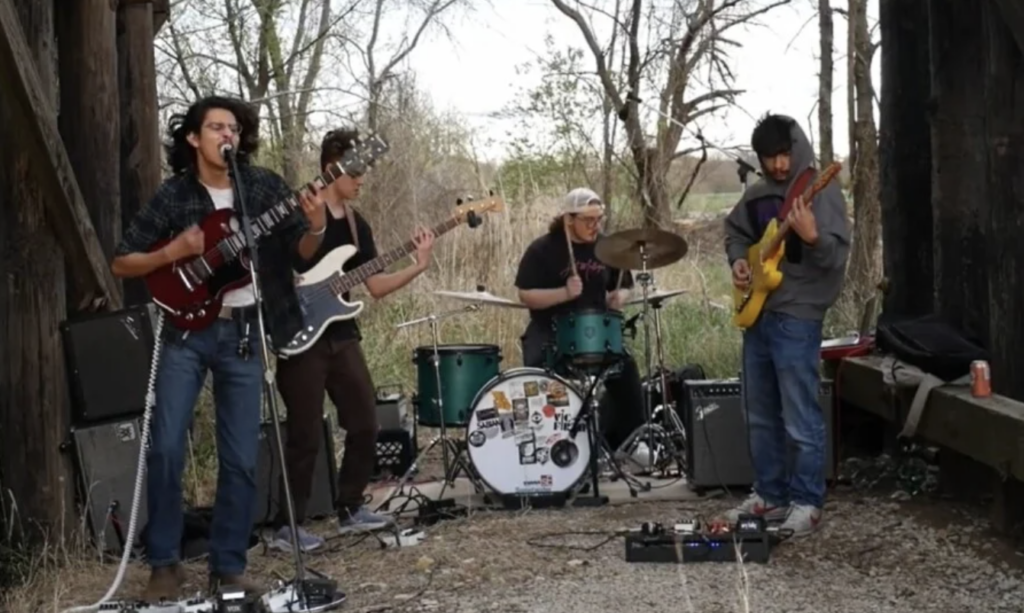Speak Now (Taylor’s Version) is a deliciously nostalgic link to adolescence, reimagined for adulthood
Her third re-recorded album debuted on the eve of her Arrowhead tour stop tonight.
Is it narcissistic to think Taylor Swift releasing Speak Now (Taylor’s Version) on the first day of her Eras Tour stop in KC was a personal gift to me? Yes, probably. But if ever there was a day to indulge in narcissism, it is today.
Welcome to Brynn’s Version… of the events leading to this moment. And, of course, a celebration of the artistic gift air-dropped to us at midnight.
Speak Now first came to me in a plastic-wrapped CD shared between my sister and me in our childhood bedroom. Now, her re-recorded third studio album all about the drama and heartache of growing up and transitioning into adulthood has re-entered my life as I sit in my own house with pre-emptive post-grad anxiety.
The genius of Swift’s songwriting lies in her ability to create a magical time capsule for the time you first heard her music, but with messages that still cut deep years down the road.
So let’s call Speak Now (Taylor’s Version) a gift to all Swifties to boot—and especially KC as we anticipate her first Eras Tour show at Arrowhead today—and paint the town purple. A city that has renamed streets in her honor and turned out Taylor-inspired cocktails, cookies, and pop-ups has surely proven its loyalty.
Her third studio album, Swift released Speak Now in 2010 on the heels of her success with Fearless (2008) and her 2006 self-titled debut album. The 16-track album is bursting with emotion, with the wisest and most honest storytelling of her career up to that point. She contemplates the bittersweet nature of childhood in “Never Grow Up,” and pleads for forgiveness from an ex-lover in “Back to December.”
Every track is a reflection of the tribulations of growing up—and finding worldwide stardom—as a young woman from the ages of 18 to 20. This was the first album where she alone wrote every song—all the more reason to re-record and regain control of her masters from the greedy grip of Scooter Braun.
In Speak Now (Taylor’s Version), Swift treats us to six tracks from The Vault that didn’t make her 2010 version, with special features from Fallout Boy in “Electric Touch” and Paramore’s Hayley Williams in “Castles Crumbling.” To me, the standout Vault track is “Emma Falls in Love,” a delightfully simple upbeat song about a hopeful romantic named Emma. The sound and lyrics of the track seem like they could easily fit into her sophomore album Fearless.
Overall, the re-recording gives us a revamped version of the original tracks with Swift’s matured vocals and wisdom from over ten years of life lived. This in turn meant the anticipated lyric change in her Paramore-esque anthem “Better Than Revenge,” lately criticized for what many have deemed misogynistic and slut-shaming lyrics. I understand and respect Swift’s decision to change lyrics she now disagrees with. Though it still feels dishonest to the album characterized by brutal honesty about the emotionally tumultuous transition to young adulthood and the lessons we learn.
View this post on Instagram
Minor lyric tweaks aside, this re-recording is largely on-par with her two previous recordings, Fearless (April 2021) and Red (November 2021). The slow-burn ballad “Dear John” still hits the same with its powerful bridge, and I could listen to the guitar and insanely catchy chorus of “Sparks Fly” on repeat. Most importantly, Speak Now (Taylor’s Version) still holds the power to connect us to past versions of ourselves we may have forgotten.
When listening to the debut album, I’m transported to the car with my mom as we sing along to “Our Song” and smile at each other through the rearview mirror. The lyrics to “You Belong with Me” are as ingrained in my brain as the Lord’s prayer, shockingly enough, and send me back to dancing to the music video at my childhood friend Kaitlin’s house.
The second I hit play on the Speak Now (Taylor’s Version) lead track Mine, I see 9-year-old me popping in the CD in my sister and I’s banged up purple boombox. As for Red, I will spare the details of my fifth-grade history project, an American Revolution-inspired rendition of “We Are Never Getting Back Together.”
For a generation that grew up in the golden era of Taylor Swift, through all ten eras she was forced to reinvent herself as a female artist—her re-recordings and Eras Tour are not only badass power moves reclaiming her art but links to our own past and memories.
A way of saying “Thank you a million times for the memories that break our fall,” as Swift said in her Instagram post.
For more sappy wistfulness, stream Speak Now (Taylor’s Version) here.





